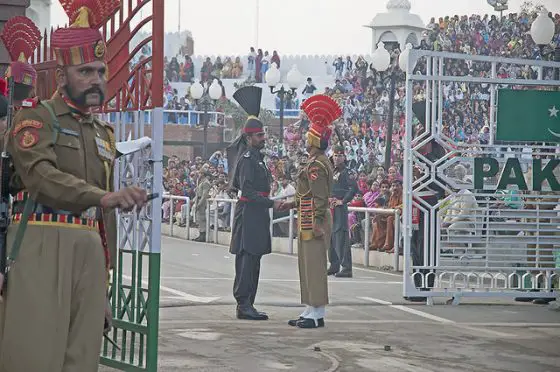Theme :-
- Since the independence, India and Pakistan have fought four wars (one undeclared war) and have engaged in a uncountable number of military standoffs.
- There have been numerous attempts to improve the relationship like the Shimla summit, the Agra summit, the Lahore summit, but as a result nothing has changed, notwithstanding the worsened conditions after the Siachen Conflict and the Kargil War of 1999. However, the ceasefire agreement of 2003 and the Delhi-Lahore Bus agreement decreased some tensions.
- The 2001 Shimla attack, the 2007 Samjhauta Express attack, the 2008 Mumbai attacks and the recent 2016 Pathankot attack, all resulted in the disruption in the Indo-Pakistan peace talks.
Causes of Conflict :-
- Kashmir Issue :-
- Kashmir issue has been the center of all the conflicts except the Indo-Pakistan war of 1971 and Bangladesh Liberation War.
- Line Of Control :-
- In the Shimla agreement, the line between the region occupied by Pakistan and the left region of India was named as ‘LINE OF CONTROL’.
- During the Shimla agreement, a referendum was passed to improve the relations that the LOC should be upgraded to IB, but could not be passed. However, in the present situation, such a solution is very difficult to implement as the population on either side will not allow its government to take such a step.
- Both the US and the UK have also favored turning the Line of Control into an international Border
- Water sharing issues :-
- The geography of partition was such that the source Rivers of the Indus basin were in India. Pakistan felt threatened that India controls over the tributaries that fed water into the Pakistan. Where India certainly had its own ambitions for the development of the Indus basin.
- The Indus Water Treaty between the two countries created an understanding of how water between the two countries would be shared. Six rivers that are; the Chenab, Indus, Beas, Sutlej, Ravi, and Jhelum flow to Pakistan from India. This treaty divided three rivers for use by each country, and India had the Beas, Sutlej, and Ravi. Pakistan had access to the Jhelum, Chenab, and Indus.
- The dispute between Pakistan and India over water has continued over several decades. Currently, the dispute revolves around the construction of a hydro-electric plant along a tributary of Indus. Although India is defending its right to construct the dam, Pakistan is raising several issues over the project.
Innovative steps to improve bilateral relations :-
- Political conferences and meetings should be organized keeping the differences aside so that several policies can be made which would result in the benefit for both of us.
- In the present day scenario, if a Referendum is passed in J&K offering independence as an option, it is possible that the majority of people would vote in favor of independence.
- In terms of livelihood, the valley could sustain itself through tourism, handicrafts, and agriculture. But an independent Kashmir Valley would also need to retain good relations with its neighbors in order to survive economically.
- An independent Kashmir Valley would have the advantage of giving neither Pakistan nor India a victory out of their longstanding dispute.
- Re-negotiation of the Indus Water treaty Could be a better solution since the treaty was made many decades ago, and it overlooked certain climate changes which occur over time, a new treaty could be signed by both the countries, which replaces the current.
- Organizing bilateral sports between the both, could result in better relations and help in improving the conditions.
- The trade could also be a good mean to reduce the tension between the two.
- The Entertainment Industry of both the countries should work together in making some masterpieces which could help in reducing regional differences between the two nations.
Afterwords :- What is your opinion on this topic? How can Indo-Pak relations be improved? Express your thoughts in the comment section below. Subscribe to our blog to get new topics delivered to your mail.
Photo Credits : Koshy Koshy via Flickr by CC 2.0
Copyright @ Group Discussion Ideas.

